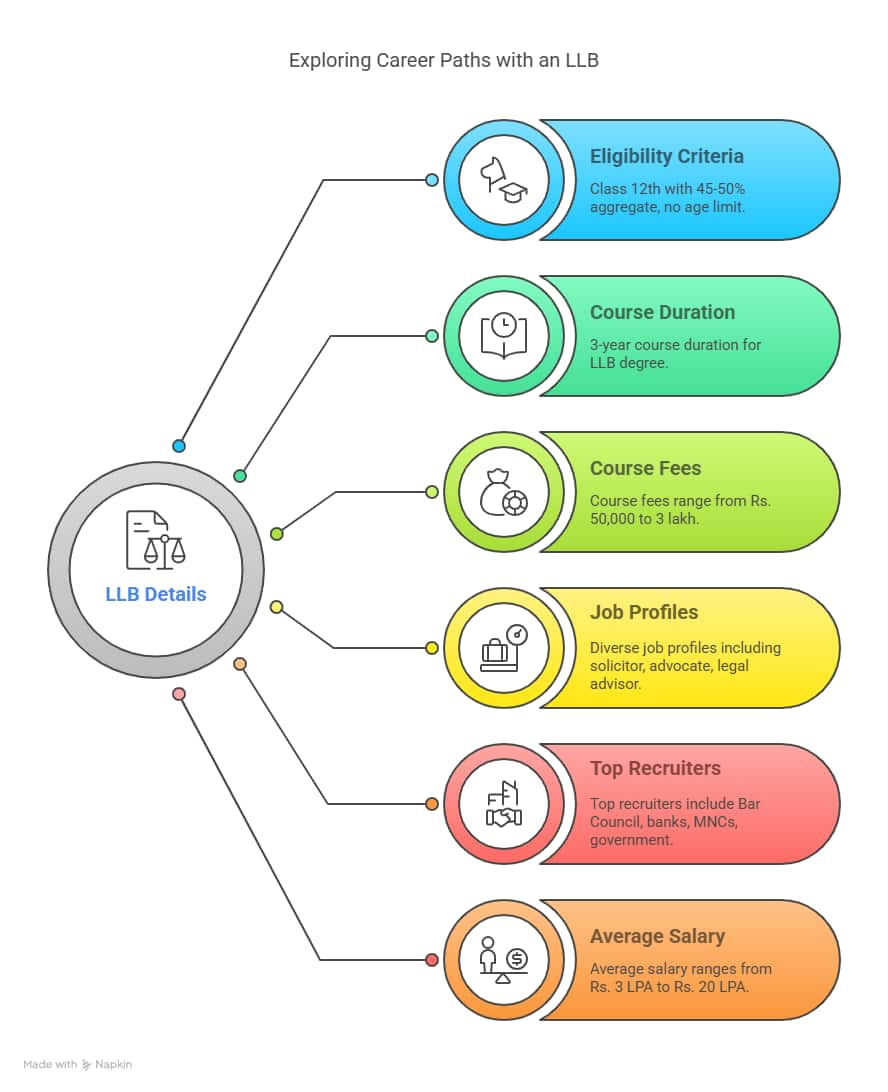Keep both CLAT and AILET options open to maximize your chances.
SPJIMR Mumbai PGDM Admissions 2026
Ranked No. 3 Business School in India and no.35 in world by Financial Times MiM 2025 Ranking | Highest CTC: INR 89 LPA
A Bachelor of Laws (LLB) degree serves as the gateway to a wide range of rewarding and prestigious career paths in the legal field. Law graduates are not confined to traditional litigation alone but can explore diverse opportunities in corporate law, judiciary, legal consultancy, public service, and international law firms. With the growing demand for legal professionals across sectors like finance, technology, policy, and human rights, an LLB offers both stability and growth. In this article, we highlight the 10 best jobs after LLB that can help you build a successful and fulfilling law career.

Also Read: Online Law Courses & Certifications
Particulars | Details |
LLB Full Form | Bachelor of Legislative Law |
Eligibility Criteria | Class 12th with a minimum aggregate of 45 to 50 per cent No age limit |
Course Duration | 3 years |
Course Fees | Rs. 50,000 - 3 lakh |
Job Profiles | Solicitor, Advocate, Legal Advisor, Law Officer, Legal Manager, Corporate counsellor, Public Prosecutor and many others |
Average Salary | Rs. 3 LPA to Rs. 20 LPA (based on the experience) |
Top Recruiters | Bar Council of India, Public and Private Sector banks, multinational companies, legal companies, outsourcing, government departments, and others |

There are plenty of options after LLB. One can choose to pursue a successful law career in India. However, students can check the top 10 best jobs after LLB below.
This is one of the most common LLB jobs, graduates choose to become by going into legal practice under a senior advocate or working in law firms. They are responsible for representing clients in the courtroom, drafting legal documents and giving legal advice to their clients. To become a successful and recognised advocate, one needs to have strong oratory skills, in-depth research skills and knowledge of legal procedure.
Salary in India: The salary of advocates in India is based on the experience and recognition they have. The salary of an advocate ranges from Rs. 2 LPA to Rs. 10 LPA. (Source: Ambitionbox)
Nowadays, corporate lawyers are in demand as of growing corporate sector tackles all the legal issues around the organisation. They are responsible for advising businesses on legal compliance, contracts, mergers, acquisitions, and dispute resolution to minimise legal risks.
Salary in India: In the beginning, corporate lawyers can earn from Rs. 6 LPA to Rs. 8 LPA, which increases up to Rs. 15 LPA to Rs. 20 LPA with experience. (Source: Glassdoor)
One of the best law jobs in India, most of the LLB graduates aim for judicial services to become judges or magistrates, as it is one of the prestigious career paths that comes with power and responsibility. They are responsible for presiding over court proceedings, interpreting laws, and ensuring justice. To pass the judicial services exam, students need to have in-depth legal knowledge and clarity to handle situations.
Salary in India: The salary of judicial officers ranges from Rs. 7 LPA to Rs. 12 LPA, depending on rank and experience. (Source: Government Salary Structures)
The role of legal advisor is especially suited for those who prefer advisory and consultancy-related work. Legal advisors mostly work with organisations such as banking, IT, and healthcare or individuals and offer legal advice to ensure legal compliance, adhering to rules and regulations. They are meant for risk management and legal documentation.
Salary in India: Rs. 5 LPA to Rs. 7 LPA for freshers and Rs. 12 LPA to Rs. 20 LPA for experienced advisors. (Source: Glassdoor)
This job profile is best suited for those who want to build their career in criminal law or public services. They are responsible for representing the state in criminal cases by investigating evidence, drafting charges and ensuring justice for the victims.
Salary in India: Starting salaries range from Rs. 4 LPA to Rs. 6 LPA, with experienced prosecutors earning Rs. 8 LPA to Rs. 12 LPA (Source: Payscale)
Also Read:
Someone who has a flair for writing or an interest in simplifying complex legal topics can choose to become a legal journalist, as this job profile requires skills of good understanding and writing to prepare the report on legal developments, judgments and policy changes by working with media houses, blogs, or legal publications.
Salary in India: Rs. 3 LPA to Rs. 5 LPA in starting, and goes up to Rs. 8 LPA to 12 LPA as a senior journalist (Source: Glassdoor)
Individuals having a higher education in law and an inclination towards teaching can choose to be law lecturers in top law colleges in India. As a lecturer, they are responsible for mentoring and teaching students about legal concepts and as researcher.
Salary in India: In India, law professors can earn Rs. 5 LPA to 8 LPA, whereas senior academicians earn Rs. 12 LPA to 15 LPA (Source: UGC Guidelines)
In opposition to the public prosecutor, a litigation lawyer is meant to represent clients in civil or criminal cases. Litigation lawyers are specialised in various areas, such as family law, criminal law, or property disputes.
Salary in India: Rs. 3 LPA to Rs. 20 LPA, depending on experience and clientele.
Also Check: Criminal Lawyer
The job profile of a legal analyst is good for those who are interested in using technology in the legal domain, as they have to evaluate legal data, interpret case laws, and assist companies or firms in decision-making by merging law with data analysis.
Salary in India: Rs. 4 LPA to Rs. 15 LPA based on the experience (Source: Glassdoor)
Individuals who want to work for social justice to make a difference in society can choose to be human rights lawyers. They advocate for fundamental rights protection by working with NGOs or international organisations.
Salary in India: In NGO, one can earn from Rs. 3 LPA to Rs. 5 LPA, while human rights lawyers working for international organisations can get from Rs. 10 LPA to Rs. 20 LPA. (Source: Glassdoor)
Explore More Jobs for Law Graduates:
1. LLM
Pursuing an LLM allows law graduates to specialise in a specific area of law, such as international law, human rights, or intellectual property. Specialisation can open doors to higher-level positions in law firms, academia, or international organisations. An LL.M. can also lead to a career in legal consulting, where specialised knowledge is highly valued.
2. MBA (Master of Business Administration)
For those interested in combining legal expertise with business acumen, an MBA is a logical next step. An MBA provides law graduates with the skills needed to manage businesses, understand financial markets, and lead organisations. This combination of skills is particularly valuable in corporate law, entrepreneurship, and management roles.
3 Diplomas and Certification Courses
Short-term courses and certifications in niche areas like cyber law, intellectual property rights, or international arbitration can enhance a law graduate's qualifications and open up specialised career opportunities. These courses offer focused training and can be completed alongside other professional commitments.
Those who want to shift their career in the law domain can also opt for a law certificate course. These law certification courses will also help the LLB graduates to gain knowledge regarding the changes in the field. Check the top providers of law certification courses.
An LLB degree offers a diverse range of career paths, each tailored to different interests and aspirations. Whether you aim to litigate, teach, or specialise in niche areas like intellectual property or arbitration, the legal field provides ample opportunities for growth and success. With the right skills, passion, and determination, you can build a rewarding career in law that not only provides financial stability but also allows you to contribute meaningfully to society.
Frequently Asked Questions (FAQs)
Depending on your area of interest, there are a variety of career options after LLB available in many industries like finance, healthcare management, entertainment and IT. You can also pursue many corporate or LLB govt jobs.
The salary scale of the career options after LLB will differ based on various factors like the job profile, experience, company and location. The jobs after LLB for freshers will have lesser remuneration than for the experienced.
Yes, you can enrol in LLB after the 12th. Also, most of the law schools in India offer 5-year integrated LLB programmes such as BA LLB, BBA LLB, BSc LLB, BCom LLB, BSW LLB and BLS LLB which can be taken after the 12th.
After LLB, the LLM (Master of Legislative Law) degree is the best programme if you want to do higher studies. Also, you can for law certificate courses to learn new aspects in a short duration and get certified.
Dual specialisation is always better for jobs after law degree. In the case of comparing CS+LLB and CS+CA, CS+LLB is more prominent a career option after law. Most companies look for individuals holding CS+LLB degrees. Hence, there are many LLB career options that candidates can pursue.
On Question asked by student community
Hello,
You can get the Karnataka State Law university (KSLU) 3 year LLb sem question and answers pdf through the link i attached below. It will help you to understand the exam pattern and enhance your exam preparation. The pdf is available for free.
Here is the link: https://law.careers360.com/articles/kslu-question-paper
https://www.ksluonline.com/
Hello,
If you are from Delhi and appearing for CLAT, then you come under the General (All India) category, as CLAT reservation is based on the domicile of NLUs, and Delhi does not have a National Law University under CLAT (NLU Delhi conducts AILET separately).So, you can apply for CLAT through All India Quota, and if you don’t get a seat in NLUs. You can apply through CLAT, AILET, or private law colleges like Amity, Symbiosis, or IPU for admission.
Keep both CLAT and AILET options open to maximize your chances.
Hope you understand.
Hello,
Yes, you are eligible for MH CET Law 2026 (3-year LLB) as you’ve completed your BCom in 2025. The basic eligibility requires a bachelor’s degree with at least 45% marks (40% for reserved categories) from a recognized university.
You can apply online through the official CET Cell Maharashtra website when the registration opens, usually between January to March 2026. The exam will test your legal aptitude, reasoning, English, and general awareness.
Hope you understand.
Hi,
According to your rank, securing a seat in the Government college in SC category can be challenging as the cutoff goes quite high. For 2025 admission the cutoff for SC category was 97.70% and the corresponding cutoff was around 99.5%. Your rank of 527 is much lower than this cutoff, meaning the admission can be quite difficult.
You can go for alternative options for other law colleges which will accept VUET score and have more accessible cutoff for SC category.
Hope it helps!!!
Hello,
No, most 5-year LLB entrance exams do not have negative marking. Exams like TS LAWCET,AP LAWCET and MH CET Law do not include negative marking. For each correct answer, you will get one mark, and there is no penalty for wrong answers. So you can attempt all the questions confidently and prepare well.
For more details follow the link: https://law.careers360.com/articles/ap-lawcet-exam-pattern
Ranked #18 amongst Institutions in India by NIRF | Ranked #1 in India for Academic Reputation by QS Rankings | 16 LPA Highest CTC
NAAC A++ Approved | Curriculum Aligned with BCI & UGC
Grade 'A+' accredited by NAAC | Ranked 33rd by NIRF 2025
Admissions Open | Globally Recognized by AACSB (US) & AMBA (UK) | 17.8 LPA Avg. CTC for PGPM 2025
#36 in NIRF, NAAC ‘A’ Grade | 100% Placement, up to 30% meritorious scholarships
Ranked #45 Among Universities in India by NIRF | 1950+ Students Placed, 91% Placement, 800+ Recruiters